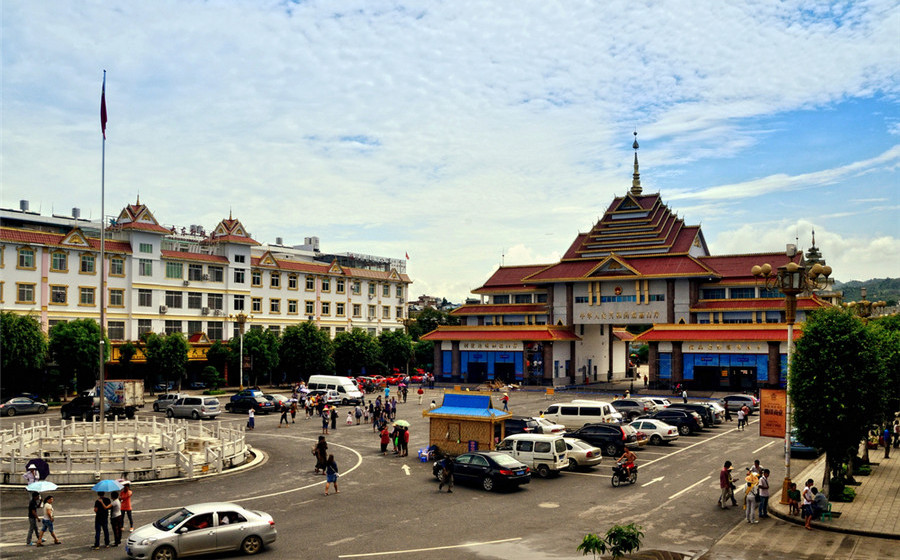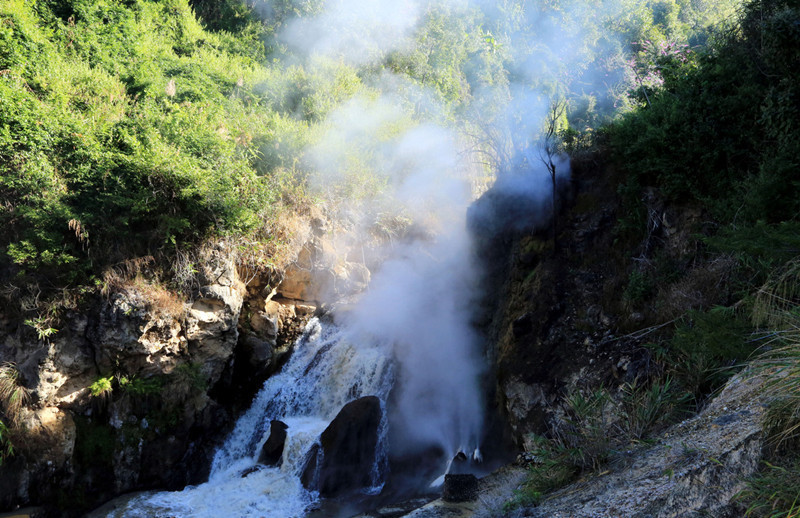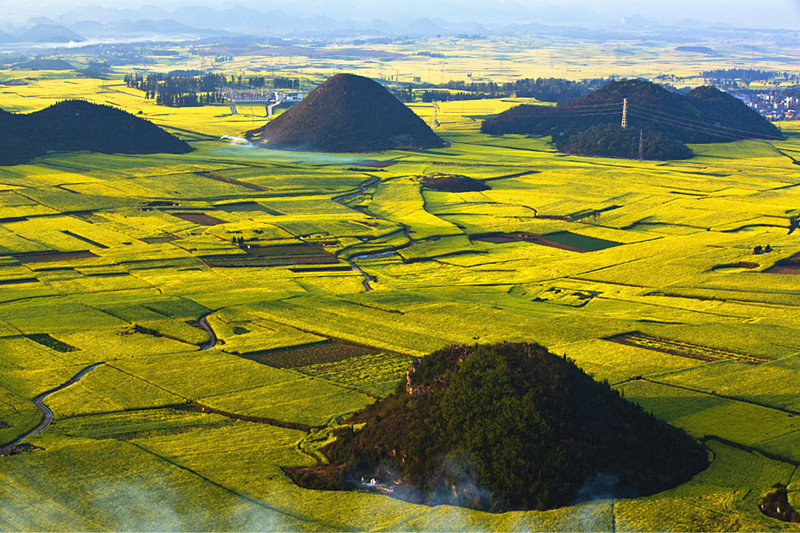
Yunnan Economy
Yunnan’s industry output is ranked 4th in western China. Yunnan’s four pillar industries include tobacco, agriculture/biology, mining, and tourism. The main manufacturing industries are iron and steel production and copper-smelting, commercial vehicles, chemicals, fertilizers, textiles, and optical instruments. Yunnan has trade contacts with more than seventy countries and regions in the world. Yunnan established the Muse border trade zone(located in Ruili) along its border with Burma. Yunnan mainly exports tobacco, machinery and electrical equipment, chemical and agricultural products, and non-ferrous metals. Its outputs of flower, tea leaves, fruits and vegetables are also very famous. Electricity industry is another important economic pillar of Yunnan, which plays a key role in the “West-East Electricity Transmission Project”.
Main Economic Pillar Industries
1. Tobacco Industry
For a long time, tobacco industry has become the most important pillar industry in Yunnan with its high profit. The flue-cured tobacco produced in Yunnan has always been the raw material for the production of high grade cigarettes in China. Yunnan has become the largest cigarette producer in China since 1987 and has been ranked first in China for five indicators such as the economic growth rate of Yunnan in the past ten years.
Yunnan is China’s largest tobacco-producing region. The largest cigarette production facility in Asia is located in Yuxi, 85 kilometers south of Kunming. Hongta District enjoys the tobacco culture and prosperous tobacco industry, and travelers can overview the history and development of tobacco culture in Tobacco Museum in Yuxi.
2. Agriculture
Yunnan province is located in Yunnan-guizhou Plateau, one of the four major highlands in China, with a stereoscopic geographical climate, vertical distribution of heat, abundant light and heat conditions as well as abundant total water resources. It has the advantaged natural conditions and ecological environment for the development of characteristic agriculture in the plateau.
Red soil of various ages covers both the eastern and western regions of Yunnan. Although only about 6 percent of Yunnan’s land is arable, the wide climatic variations assure the province a variety of crops. Rice is by far the most important basic food grain raised in Yunnan. In the upland plains, in the open valleys, and on the terraced hillsides, rice is the principal summer crop, with corn(maize) an important secondary crop. Other summer crops in the rice regions include sweet potatoes, vegetables, sugarcane, and tea. Winter crops in the rice regions include wheat, barley, beans, peas, and rapeseed. Among the hill peoples, corn, barley, and wheat are raised in summer in drier fields. Peaches, persimmons, walnuts, and chestnuts are also produced locally. In the extreme south, especially in the low-lying valleys, bananas, coconuts, and coffee are grown. The tea from Pu’er has a worldwide reputation.
3. Mining
Yunnan is one of the major production bases of copper, lead, zinc, tin and aluminum in China. Gejiu city is well known as “the Kingdom of Zinc” with the reserves ranked first in the country. The Yunxi brand refined tin is one of the main products in Gejiu, which is registered on the London Nonferrous Metal Exchange. Besides, reserves of germanium, indium, zirconium, platinum, rock salt, sylvite, nickel, phosphate, mirabilite, arsenic and blue asbestos are also high.
Yunnan province has some of the world’s largest tin deposits, and the leading extractive industry is tin mining. Tin is mined in the southeastern part of the province and west of the Lancang River. Yunnan is also a large producer of copper, which is mined chiefly in the Huize region. Dongchuan is also one of the center of lead and zinc mining in the province. Another major lead and zinc mining center is located at Lanping in western Yunnan.
Yunnan has moderate deposits of coal and iron; in addition, some petroleum and natural gas reserves have been discovered in certain basin areas in the southwestern and eastern parts of the province. Other mineral products include antimony, tungsten, mercury, phosphorus, silver, placer gold, cinnabar (the ore of mercury), and manganese. Tungsten and phosphorus are mined near Kunming. Gypsum, sulfur, fluorite, arsenic, alum, and asbestos also exist in large quantities. Deposits of bauxite provide the basis for an aluminum industry. Marble quarried at Dali is eagerly sought, both as building material and for interior decoration. The saltpetre extracted from rock salt mined at Kunming is used to make fertilizers, explosives, and food preservatives.
4. Tourism
Yunnan is famous at home and abroad for its unique plateau scenery, tropical and subtropical frontier scenery and colorful ethnic customs. Rich in tourism resources, a number of scenic spots in the featuring of mountain canyons, modern glaciers, plateau lakes, stone forests, karst caves, volcanic geothermal, primitive forests, flowers, cultural relics, traditional gardens and minority folk-custom were built. There are more than 200 scenic spots in the province, among which 12 are listed as national scenic spots, 53 as provincial scenic spots. There are 6 famous national historical and cultural cities, 11 provincial historical and cultural cities, 6 famous national historical and cultural villages and towns, 14 provincial historical and cultural towns, 14 provincial historical and cultural famous villages and 1 provincial historical and cultural street.
Scenic Spots
Any question about Yunnan Tour, please contact us by Email: contact@YunnanExploration.com, or Phone: 0086-871-63511469, Wechat: 908400838, Emergency Call:+86-13668720322.

 7 Days GolfingTour
7 Days GolfingTour
 8 Days Group Tour
8 Days Group Tour
 8 Days Yunnan Tour
8 Days Yunnan Tour
 7 Days Shangri La Hiking
7 Days Shangri La Hiking
 11 Days Yunnan Tour
11 Days Yunnan Tour
 6 Days Yuanyang Terraces
6 Days Yuanyang Terraces
 11 Days Yunnan Tour
11 Days Yunnan Tour
 8 Days South Yunnan
8 Days South Yunnan
 7 Days Tea Tour
7 Days Tea Tour
 8 Days Muslim Tour
8 Days Muslim Tour
 12 Days Self-Driving
12 Days Self-Driving
 4 Days Haba Climbing
4 Days Haba Climbing
 Tiger Leaping Gorge
Tiger Leaping Gorge
 Stone Forest
Stone Forest
 Yunnan-Tibet
Yunnan-Tibet
 Hani Rice Terraces
Hani Rice Terraces
 Kunming
Kunming
 Lijiang
Lijiang
 Shangri-la
Shangri-la
 Dali
Dali
 XishuangBanna
XishuangBanna
 Honghe
Honghe
 Kunming
Kunming
 Lijiang
Lijiang
 Shangri-la
Shangri-la
 Yuanyang Rice Terraces
Yuanyang Rice Terraces
 Nujiang
Nujiang
 XishuangBanna
XishuangBanna
 Spring City Golf
Spring City Golf
 Snow Mountain Golf
Snow Mountain Golf
 Stone Mountain Golf
Stone Mountain Golf















